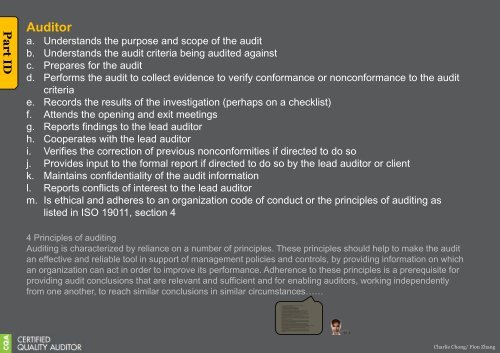My Reading on ASQ CQA HB Part I-IA~IE-s
Create successful ePaper yourself
Turn your PDF publications into a flip-book with our unique Google optimized e-Paper software.
The guidance given in Clauses 5 to 7 is based <strong>on</strong> the six principles outlined below.<br />
a) Integrity: the foundati<strong>on</strong> of professi<strong>on</strong>alism<br />
Auditors and the pers<strong>on</strong> managing an audit programme should:<br />
— perform their work with h<strong>on</strong>esty, diligence, and resp<strong>on</strong>sibility;<br />
— observe and comply with any applicable legal requirements;<br />
— dem<strong>on</strong>strate their competence while performing their work;<br />
— perform their work in an impartial manner, i.e. remain fair and unbiased in all their dealings;<br />
— be sensitive to any influences that may be exerted <strong>on</strong> their judgement while carrying out an audit.<br />
b) Fair presentati<strong>on</strong>: the obligati<strong>on</strong> to report truthfully and accurately<br />
Audit findings, audit c<strong>on</strong>clusi<strong>on</strong>s and audit reports should reflect truthfully and accurately the audit<br />
activities. Significant obstacles encountered during the audit and unresolved diverging opini<strong>on</strong>s between<br />
the audit team and the auditee should be reported. The communicati<strong>on</strong> should be truthful, accurate,<br />
objective, timely, clear and complete.<br />
c) Due professi<strong>on</strong>al care: the applicati<strong>on</strong> of diligence and judgement in auditing<br />
Auditors should exercise due care in accordance with the importance of the task they perform and the<br />
c<strong>on</strong>fidence placed in them by the audit client and other interested parties. An important factor in carrying<br />
out their work with due professi<strong>on</strong>al care is having the ability to make reas<strong>on</strong>ed judgements in all audit<br />
situati<strong>on</strong>s.<br />
d) C<strong>on</strong>fidentiality: security of informati<strong>on</strong><br />
Auditors should exercise discreti<strong>on</strong> in the use and protecti<strong>on</strong> of informati<strong>on</strong> acquired in the course of<br />
their duties. Audit informati<strong>on</strong> should not be used inappropriately for pers<strong>on</strong>al gain by the auditor or the<br />
audit client, or in a manner detrimental to the legitimate interests of the auditee. This c<strong>on</strong>cept includes the<br />
proper handling of sensitive or c<strong>on</strong>fidential informati<strong>on</strong>.<br />
e) Independence: the basis for the impartiality of the audit and objectivity of the audit c<strong>on</strong>clusi<strong>on</strong>s<br />
Auditors should be independent of the activity being audited wherever practicable, and should in all<br />
cases act in a manner that is free from bias and c<strong>on</strong>flict of interest. For internal audits, auditors should<br />
be independent from the operating managers of the functi<strong>on</strong> being audited. Auditors should maintain <strong>on</strong> the audit evidence.<br />
For small organizati<strong>on</strong>s, it may not be possible for internal auditors to be fully independent of the activity<br />
being audited, but every effort should be made to remove bias and encourage objectivity.<br />
f) Evidence-based approach: the rati<strong>on</strong>al method for reaching reliable and reproducible audit c<strong>on</strong>clusi<strong>on</strong>s<br />
in a systematic audit process<br />
Audit evidence should be verifiable. It will in general be based <strong>on</strong> samples of the informati<strong>on</strong> available,<br />
since an audit is c<strong>on</strong>ducted during a finite period of time and with finite resources. An appropriate use of<br />
sampling should be applied, since this is closely related to the c<strong>on</strong>fidence that can be placed in the audit<br />
c<strong>on</strong>clusi<strong>on</strong>s.<br />
<strong>Part</strong> ID<br />
Auditor<br />
a. Understands the purpose and scope of the audit<br />
b. Understands the audit criteria being audited against<br />
c. Prepares for the audit<br />
d. Performs the audit to collect evidence to verify c<strong>on</strong>formance or n<strong>on</strong>c<strong>on</strong>formance to the audit<br />
criteria<br />
e. Records the results of the investigati<strong>on</strong> (perhaps <strong>on</strong> a checklist)<br />
f. Attends the opening and exit meetings<br />
g. Reports findings to the lead auditor<br />
h. Cooperates with the lead auditor<br />
i. Verifies the correcti<strong>on</strong> of previous n<strong>on</strong>c<strong>on</strong>formities if directed to do so<br />
j. Provides input to the formal report if directed to do so by the lead auditor or client<br />
k. Maintains c<strong>on</strong>fidentiality of the audit informati<strong>on</strong><br />
l. Reports c<strong>on</strong>flicts of interest to the lead auditor<br />
m. Is ethical and adheres to an organizati<strong>on</strong> code of c<strong>on</strong>duct or the principles of auditing as<br />
listed in ISO 19011, secti<strong>on</strong> 4<br />
4 Principles of auditing<br />
Auditing is characterized by reliance <strong>on</strong> a number of principles. These principles should help to make the audit<br />
an effective and reliable tool in support of management policies and c<strong>on</strong>trols, by providing informati<strong>on</strong> <strong>on</strong> which<br />
an organizati<strong>on</strong> can act in order to improve its performance. Adherence to these principles is a prerequisite for<br />
providing audit c<strong>on</strong>clusi<strong>on</strong>s that are relevant and sufficient and for enabling auditors, working independently<br />
from <strong>on</strong>e another, to reach similar c<strong>on</strong>clusi<strong>on</strong>s in similar circumstances……<br />
Charlie Ch<strong>on</strong>g/ Fi<strong>on</strong> Zhang

















